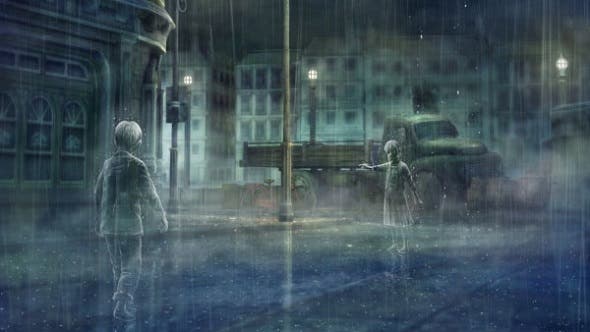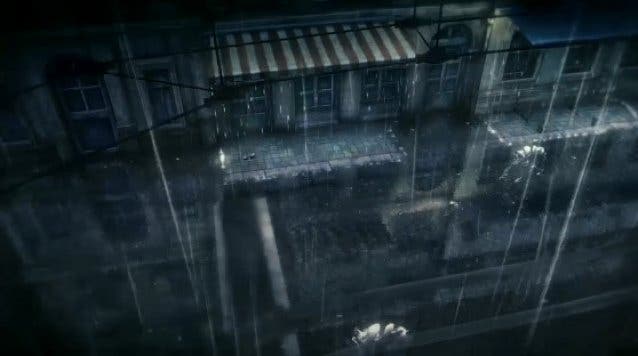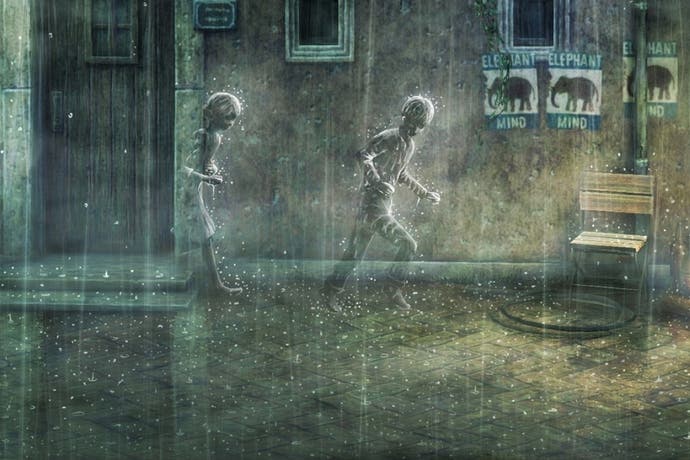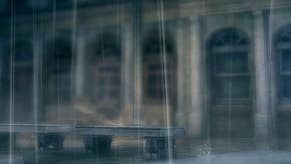Rain review
The lost and the damp.
Rain is a game about sacrifice. It's about a boy who casts off his physical form to save a ghostly girl from the monsters pursuing her through the drizzly streets of a sleeping city. It's also about a potentially promising psuedo-stealth puzzle-platformer that has undermined its mechanics somewhat in the service of the cinematic ambitions of a fairy-tale narrative. That narrative, in turn, is bent out of shape so that the developers can recreate a single image over and over, throwing boy and girl together and then separating them again to frame that magical moment where he suddenly spies her in the distance and silently implores her to wait.
There's a great game here, in other words, but all too often Rain can only brush up against it. Sony Japan Studio's latest is sweet, earnest and richly atmospheric, but it's also clumsy and insubstantial - a missed opportunity.
Still, that central conceit is wonderful: a game of sneaking and skulking in which you play as an invisible protagonist. Rain really sells your invisibility, too, allowing you to shepherd an unseen body around the screen for audaciously lengthy periods of time, navigating only by means of the clumps of grass you stir, the wet footprints you create, or the bottles and scraps of newspaper you scatter in your wake.
That's indoors or under an awning, anyway. Walk out into the open rain and you're invisible no longer. Suddenly you're a wisp - a negative-boy drawn in the spitter and spatter of a hundred raindrops. The ghostly, invisible monsters that terrorise the girl you're trying to save can be glimpsed in the rain too, as can the girl herself. Everyone becomes a shifting slice of dribbly space - space that your eyes can get a rough bead on without ever getting a sense of the complete picture.

It's brilliantly coy, particularly when it comes to the starkly horrific presence of the Unknown, the leader of Rain's spindly and often be-hoofed antagonists. He's a child catcher pulled from an artsy, early-20th-century nightmare - a lopsided and angular clump of Futurist sculpture with a single finger extended like a baton as he tries to track the young heroes from one street to the next. He gains immeasurably from the incomplete manner in which the downpour reveals his form. Evading him and his pals - until the very end of the game, you have no real offensive options to speak of - forms the bulk of the adventure here. Pursued and seeking safety, you move through the night, staying out of sight as much as possible, emerging only to distract foes or lead them astray.
There's a fair amount of mechanical invention to all this. If awnings create dry areas that allow you to slip into the ether, mud ensures you're visible even when you are under cover, while puddles will clean you off again, but will also alert enemies to your location.
These enemies, in turn, come in a variety of shapes and sizes, and Rain employs them in a handful of different ways - allowing you to move in relative safety beneath the large bellies of some of the big ones, say, or letting you unleash the smallest critters on the middle-sized guys to eat them alive. There are sections where you have to shift machinery around to create cover, and there's a great moment where you must duck in and out of lockers as you avoid detection. Then, once boy and girl are united, rather than the escort mission you might have feared, you get a series of simple two-handed puzzles - multi-part manipulations of the environment where you and your pal help each other out, often separated by walls or gantries.
Over the course of three or so hours, it's enough to keep you busy, but never truly challenged. Rain's one of those games where the pieces never actually amount to very much. Given the tools that are theoretically at your disposal, it can be hard not to find yourself longing for just a slight element of actual free-form stealth - not a Sam Fisher neck-breakathon by any means, just a moment or two where things open out and you get to read the landscape and experiment. In truth, though, Rain is a platforming-puzzler rather than a stealth game, and it uses its very basic hide-and-seek elements in extremely prescriptive ways. There's a single preordained solution to every situation you're thrown into, and, while the game's never difficult, there's inevitably a bit of stop-start pacing in play as you try to work out what the game wants you to do, or die trying all the other promising things it never intended you to investigate.
There's nothing wrong with making a fiercely linear adventure like this, of course, but it feels like a waste of some elegant mechanics when the moment-to-moment progression is often so flat. If the developers had let you loose every now and then, they could probably have solved two problems - challenging you more with the central action while also sending you back to the last checkpoint a lot less.
I suspect that a major reason Rain is so controlling is the cinematic camera, which behaves itself when framing the action, but results in fairly limited environments: a slow progression of small courtyards and short corridors. The locations you travel through each bring their own gimmicks, but, circus or abandoned factory, they never give you room to really explore. Platforming, meanwhile, is adequate but rather stiff. There's no sense of momentum as you leap from one rooftop to the next, since the animation is surprisingly stilted and contextual prompts can be fiddly.

As for the narrative that the cinematic camera serves, Rain's tale is too flimsy and poorly-paced to build into something significant. There are stand-out moments - particularly early on when the rain flickers over the screen like scratches on old film and Debussy's Clair de Lune takes shape from the tentative meanderings of the soundtrack - but the story keeps playing the same tricks: a grind of separations and reunitings, of chases and last-minute escapes that circulate with no real escalation. Even when the last act offers a little welcome variation, Rain never quite transforms into what it probably wants to be - Ico by way of René Clair, a poignant human tale told wordlessly and with a stylish European slant.
It's a shame, because the atmosphere throughout is wonderful. Rain's arcades and alleyways, clearly based on the 20th-century myth of Paris as much as any particular city's reality, is gorgeously realised despite simple geometry and repeated textures. Under boiling skies and by the banks and sluices of a swift-moving river, it's the perfect place to stage a gloomy children's fantasy full of menace and melancholy. The game that actually draws on this magical midnight ambience is perfectly acceptable and intermittently enjoyable, but it meanders and runs out of ideas, and it lacks the kind of striking narrative that could assauge the absence of genuine challenge or playfulness.
It will be hard to forget your trip onto these rainy streets perhaps, but it may prove equally tricky to remember what you actually did when you were there.










